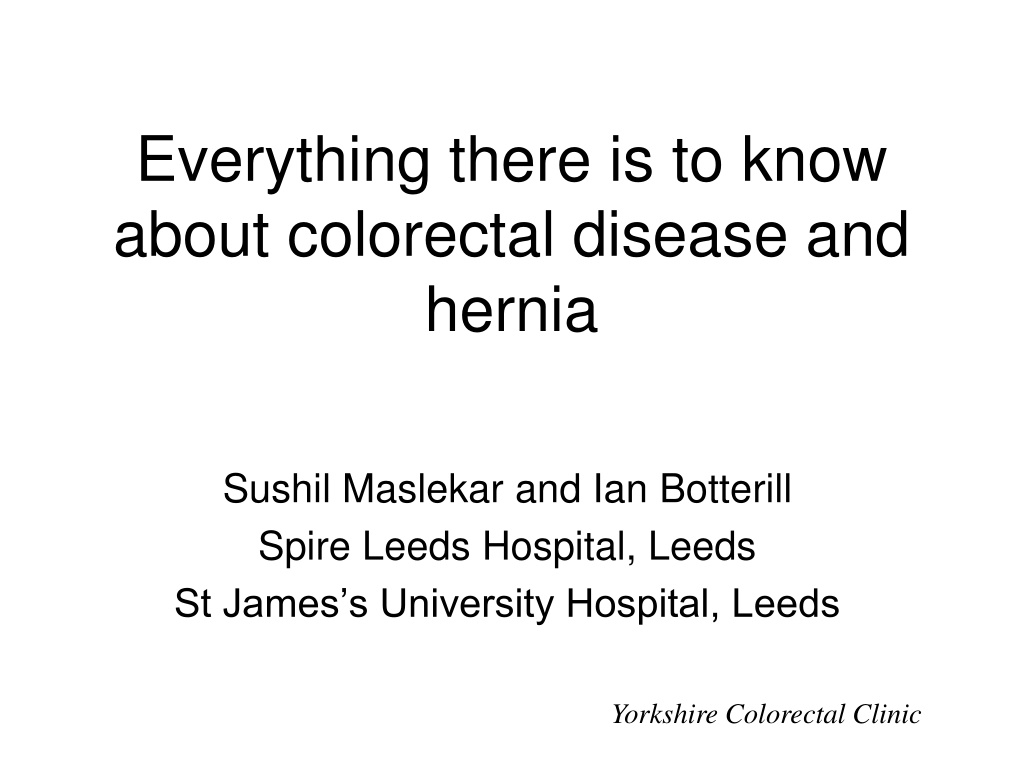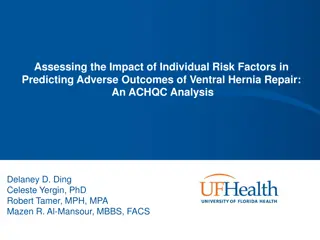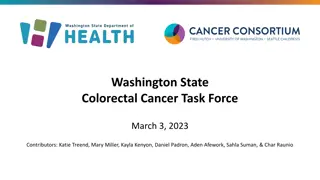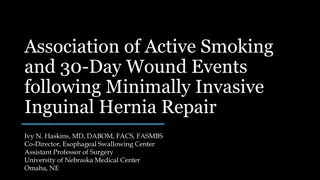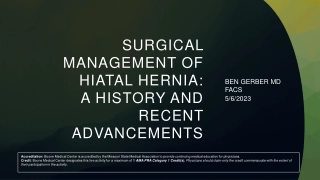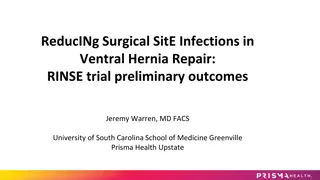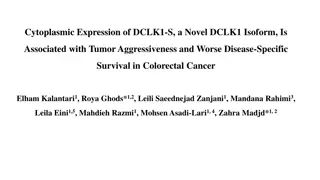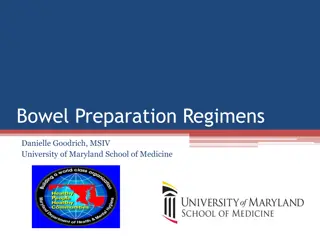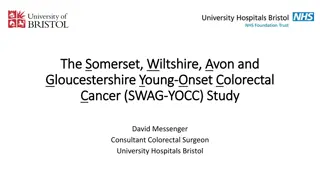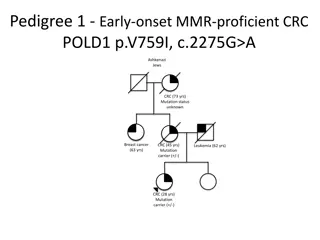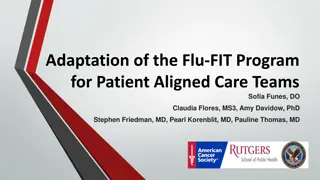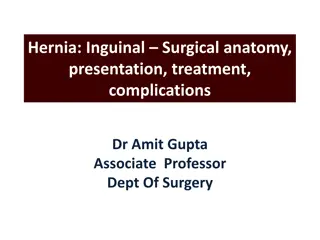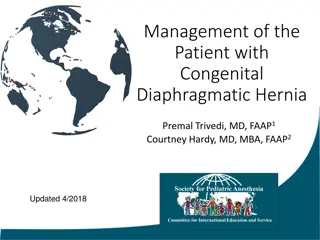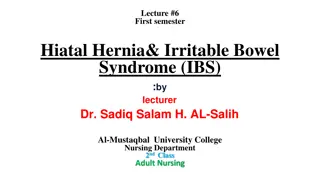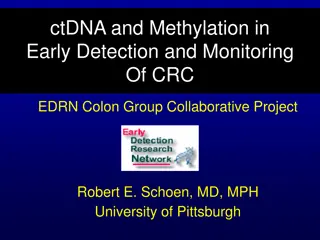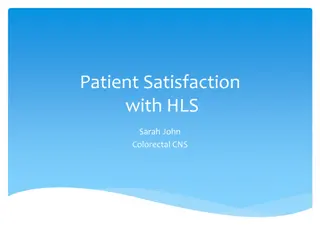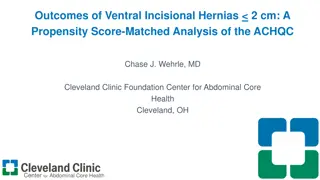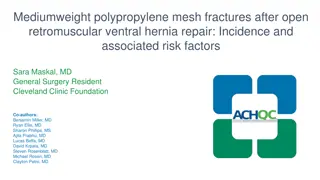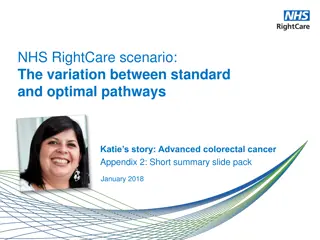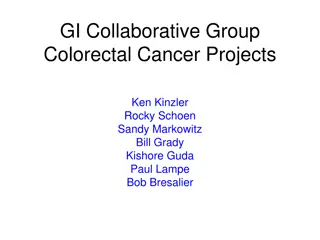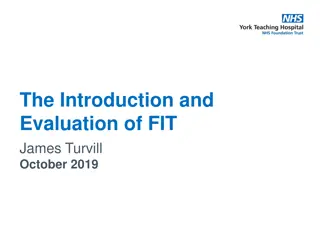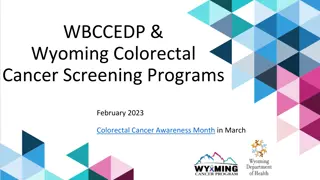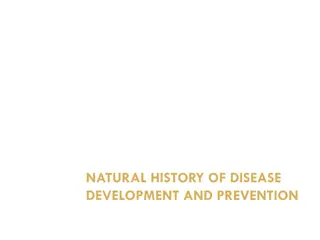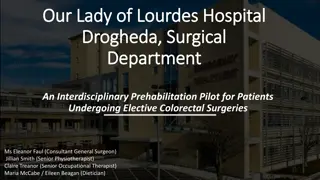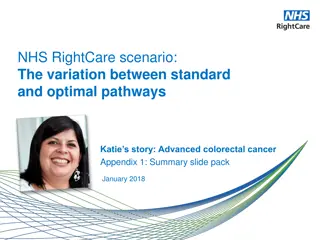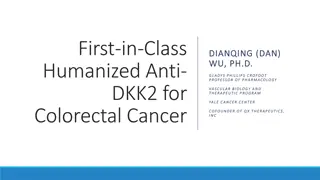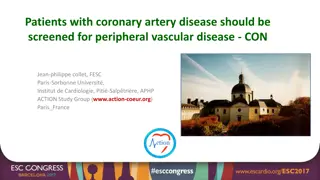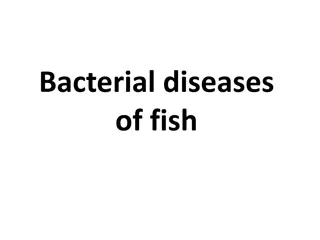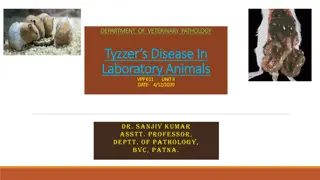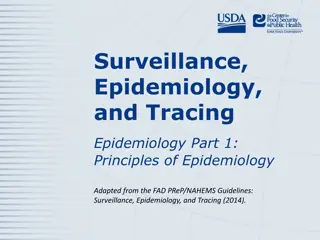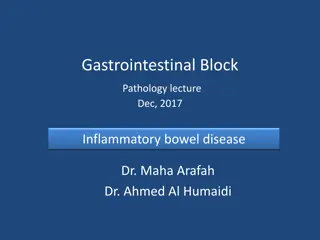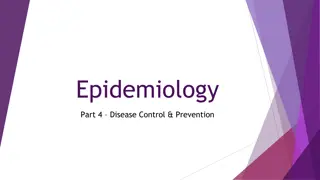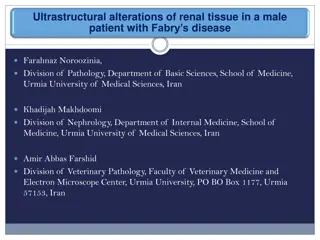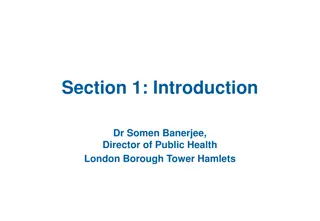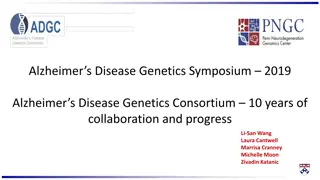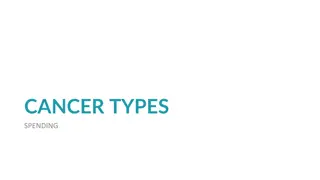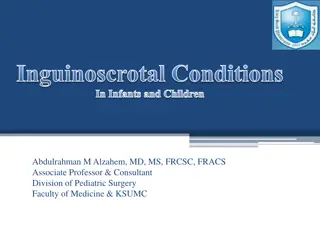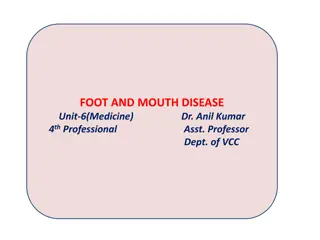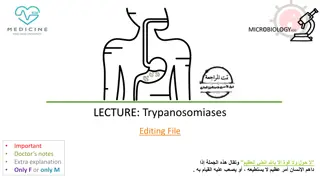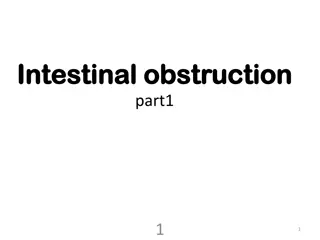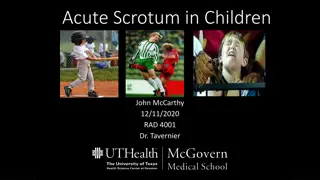Understanding Colorectal Disease and Hernia: Comprehensive Overview
Exploring various aspects of colorectal disease and hernia, this overview covers symptoms, family history significance, approach to FHx issues, patient management based on FHx, new 2WW bowel cancer referral guidelines, and the use of faecal calprotectin as a marker. Detailed information provided by Sushil Maslekar, Ian Botterill, and Yorkshire Colorectal Clinic.
Download Presentation

Please find below an Image/Link to download the presentation.
The content on the website is provided AS IS for your information and personal use only. It may not be sold, licensed, or shared on other websites without obtaining consent from the author. Download presentation by click this link. If you encounter any issues during the download, it is possible that the publisher has removed the file from their server.
E N D
Presentation Transcript
Everything there is to know about colorectal disease and hernia Sushil Maslekar and Ian Botterill Spire Leeds Hospital, Leeds St James s University Hospital, Leeds Yorkshire Colorectal Clinic
Altered bowel habit Bleeding Diarrhoea / constipation Mucous Straining / tenesmus Abdo pain Weight loss Yorkshire Colorectal Clinic
Family history ~15-25% of bowel cancer sufferers have some element of FHx Key factors 1stdegree relative <45 >one 1stdegree relative any age >two 2nddegree relatives <45 Yorkshire Colorectal Clinic
How to approach FHx issues Ask about related cancers: breast / ovary Establish closest / youngest relatives If pt is symptomatic refer urgently to colorectal If pt is asymptomatic, refer to colorectal surgery or genetics Yorkshire Colorectal Clinic
What is done with patients with a FHx? Genetic counsellors create a family tree Grade cases as high/moderate/low risk Low risk > same as population > NBCSP at entry age High risk - > colonoscopy at ~10yrs before closest index relative, then ~18/12 ly- option of genetic testing (pros & cons) Moderate risk: 3-5 yearly colonoscopy or colonoscopy at 45 & 55 yrs. Yorkshire Colorectal Clinic
New 2WW bowel cancer referral guidelines BRRB Loose stool Loose stool with blood Rectal mass Iron def anaemia Abdominal mass flexi sig colonoscopy colonoscopy clinic OGD/colonoscopy or CTC CT or clinic - any of the above in an unfit patient > clinic first Major future differences: -less emphasis on duration of symptoms and / or age Impact: more testing, more infrastructure needed Yorkshire Colorectal Clinic
Faecal calprotectin Marker released by activated neutrophils (large > small bowel) ~ 40/test Use: to help identify low risk patients in primary care from higher risk ie to aid in triaging of referrals Yorkshire Colorectal Clinic
Case example 25yr female Occ loose & stool bloating Related to anxiety No dietary factors, foreign travel, contacts Bloods? Stool culture? Faecal calprotectin? Yorkshire Colorectal Clinic
Further management Bloods N tTG N Stool culture normal Calprotectin ~50-100 Management? Yorkshire Colorectal Clinic
Bowel cancer screening (for population) Bowel scope ie one off flexible sigmoidoscopy - ~ 55yrs Faecal occult blood testing - 60-69 (age extension, now > 75 yrs) - standard exclusions: certain foods, iron tabs, red wine etc Screening if positive > colonoscopy or CT colon No role for CEA testing the undiagnosed case in primary care Yorkshire Colorectal Clinic Yorkshire Colorectal Clinic
Pros & cons of screening Pros Cons from negative tests -uptake falls off in second round of screening -earlier stage cancers -fewer acute presentations -patients may take false reassurance Yorkshire Colorectal Clinic
IBD & other forms of colitis Basic workup for suspected IBD -bloods: CRP, tTG, LFT, FBC & stool culture Faecal calprotectin -valuable for loose stool / bloating (with no blood, weight loss, Hx of cancer etc) Yorkshire Colorectal Clinic
Colonoscopy: Indications -iron def anaemia -loose stool +/- blood -IBD surveillance -abnormal CT colon -family Hx of CRC Sedation or Entonox Risk of perforation: 1/1000 for a diagnostic procedure Risk of perforation increases with size of polypectomy Yorkshire Colorectal Clinic
Flexible sigmoidoscopy Indication: -BRRB -constipation -incontinence Safer Typically no sedation Yorkshire Colorectal Clinic
CT colon Best for cancers & polyps > 0.5-1cm Good test, less invasive than colonoscopy, lacks ability to biopsy Prep can still be daunting for frail patients Indications: frail, failed colonoscopy, established left colon cancer (as part of staging) Can miss: diverticulosis smaller polyps, distal disease, disease in presence of severe Yorkshire Colorectal Clinic
Drugs for acute UC in primary care Exclude infective gastroenteritis -stool culture Acute flare: 5mg/week Calcichew D3 forte dose of mesalazine 4.8g/d -prednisolone 40mg/d, decreasing by -concomitant Calceos / -maximal IBD helpline available for early phone call returned by nurse specialist Yorkshire Colorectal Clinic Yorkshire Colorectal Clinic
Proctitis (UC or CD) Acute flare > hard to retain enemas Options (availability inconsistent) oral steroids retain) mesalazine suppositories -predsol suppositories -salofalk enemas (easier to - - Yorkshire Colorectal Clinic Yorkshire Colorectal Clinic
IBS & other bowel diseases IBS commonplace Therefore other diseases eg IBD, etc may coexist with IBS Eg known IBD with normal CRP, normal calprotectin/colonoscopy, no blood or mucous, but with loose stool / bloating may well have co-existent IBS Treatment: exclude active IBD, reassure, treat IBS in own right Yorkshire Colorectal Clinic
Drugs for maintenance of UC Mesalazine 2.4g/d Azathioprine -weight / TPMT level dependent, typically 2.5 x wt (kg) -reduced TPMT > dose at 1-1.25 x wt (kg) 6 mercaptopurine -dose at ~1-1.25 x wt (kg) Infliximab / vedolizumab Yorkshire Colorectal Clinic
Drug side effects 5 ASA -rash, jt pains, nephritis Azathioprine guidleines) cell lymphoma (responds to dose reduction/halving) -neutropaenia, abnormal LFTs (shared care -pancreatitis -haematuria -B -lethargy / flu like illness 6MP -similar Yorkshire Colorectal Clinic
Enhanced recovery after surgery ERAS Target discharge ~ day 4/5 after GI resection Resultant risk of developing complication in community Anastomotic leak: HR , RR , temp , BP / Obstruction High output ileostomy Wound infection Yorkshire Colorectal Clinic
Concern post ERAS Phone Surgical Assessment Unit (open 24/7) Patients will have contact number for a Colorectal Nurse Specialist Very low threshold for re-assessment / readmission Yorkshire Colorectal Clinic Yorkshire Colorectal Clinic
Bowel cancer Increasing: ~40,000 cases/annum increase in right sided cancers Cardinal symptoms: distal: rectal bleeding, wet wind , tenesmus, loose stool proximal: iron def anaemia, features of obstruction Resection rate ~60-65% oncologically unsuitable -remainder physically or Yorkshire Colorectal Clinic
Bowel cancer ~20% still present acutely (typically with more advanced disease) Of those in the FOB NBCSP - ~70% will get picked up as having cancer - ie ~30% with cancer / malignant polyp will have a false negative-so, if symptoms concern exists, ignore the negative test Yorkshire Colorectal Clinic
Overactive stoma in primary care Newly created ileostomy Ileostomy & gastroenteritis Short bowel syndrome HR, BP, lying & standing BP FBC (haematocrit), U&E, urinary sodium Diet: smaller snacks Double strength dioralyte Loperamide melts (up to 24x/d), codeine (up to 180mg/d) Yorkshire Colorectal Clinic
Bowel cancer follow up CT Colonoscopy CEA Annual wellbeing visit to nurse specialists 5 years colonoscopy surveillance -unless young and undergoing Aim: detection recurrence, management of late side effects eg 2y RT Yorkshire Colorectal Clinic
Approach to rectal bleeding in the primary care Over riding concern What s dangerous i.e. Exclusion of malignancy Algorithm for treatment of benign conditions Referral pathways Yorkshire Colorectal Clinic
Rectal bleeding Consultation incidence rate 7/1,000 patients 3-4% have bowel cancer Commonest causes: Haemorrhoids and Anal fissures Yorkshire Colorectal Clinic
Other Causes diverticular disease polyps/colorectal cancer/anal cancer radiation proctitis gastroenteritis angiodysplasia ischaemic colitis anorectal trauma Yorkshire Colorectal Clinic
Rectal Bleeding- What s dangerous?? Risk of cancer in patient with rectal bleeding over 40 yrs old ~ 3- 3-5% With bleeding and a change in bowel habit double the risk Change in bowel habit to looseness or increased frequency is more concerning than constipation Yorkshire Colorectal Clinic
2wk Fast track referral >50 y with unexplained rectal bleeding <50 with rectal bleeding and - abdominal pain -change in bowel habit -weight loss -iron-deficiency anaemia [new 2015] Rectal or abdominal mass Yorkshire Colorectal Clinic
Routine Referral/Investigate if: family history of colorectal malignancy anxiety about colorectal malignancy persistent rectal bleeding despite treatment for haemorrhoids rectal bleeding in patients with a past history of pelvic radiotherapy assessment of suspected inflammatory bowel disease Yorkshire Colorectal Clinic
Approach to pr bleeding Detailed history Age of the patient Presence of other symptoms Past medical history Examination- abdomen and rectal DRE especially important if no further referral being made- haemorrhoids etc. / Yorkshire Colorectal Clinic The Yorkshire Colorectal Clinic
Approach An extremely common symptom Who do we investigate? History Alarm Symptoms Older patients Amount/ Volume/ Frequency Is blood anorectal in origin (outlet type)? or more proximal Colour Mixed in with stool/ on toilet paper/coating stool Yorkshire Colorectal Clinic
Refer if : Family History 1x 1stdegree relative >55yr RR = 2 counsel as per average risk 1st st degree < 55, or 2x 1st degree any age RR = 4 4-6 Genetic Syndromes Familial Adenomatous Polyposis Hereditary Non Polyposis Colorectal Carcinoma Inflammatory Bowel disease Yorkshire Colorectal Clinic
What else is dangerous? Anal Cancer A rare cancer Similar pathology to cervical cancer Secondary to Human Papilloma virus (esp subtype 16) Progressive atypia AIN I ?? III ?? Cancer Hugely increased risk in HIV + ve Treatment initially with Chemoradiotherapy Salvage resection Yorkshire Colorectal Clinic
Whats not dangerous? Anorectal causes of rectal bleeding Significant IMPACT on quality of life Haemorrhoids Fissure in Ano Pruritis Ani Fistula REFER if symptomatic/failed conservative treatment/affecting quality of life Yorkshire Colorectal Clinic
Approach 63 yr old female Severe bleeding pr (and perianal discomfort) Conservative treatment for 10 years Next step? Yorkshire Colorectal Clinic
Rectal bleeding 28y female; intermittent bleeding Haemorrhoids on exam Next step? Yorkshire Colorectal Clinic
Conservative management Treat constipation / slow transit bowel dietary advice/increase water intake Adequate fibre (not excess) Stool softeners/Laxatives Avoid straining during defecation Find out patients expectations REFER if symptomatic with bleeding/prolapse/pain Yorkshire Colorectal Clinic
Haemorrhoids 40y male; haemorrhoids for 10 years Conservative treatment given Still very symptomatic Next step? Routine referral for treatment Yorkshire Colorectal Clinic
Treatment options Yorkshire Colorectal Clinic
Treatment options Injection sclerotherapy/ rubber band ligation 60% efficacy; only for small haems HALO day case procedure Minimal/painless procedure Back to work next day Minimal risks/complications Efficacy 85-90% Haemorrhoidectomy day case procedure Efficacy >95% 4-6 weeks wound healing Significant post op pain/discomfort Time off work around 2-3/52 Yorkshire Colorectal Clinic
Haemorrhoids (MY APPROACH) Bleeding Prolapse +/- Bleeding +/- PR Discharge Dietary Advice +/- Laxatives Avoid straining Flexible Sigmoidoscopy Grade II, III or Circumferential Grade IV + Skin tags Warfarin Anticoagulants HALO 2 stage HALO Haemorrhoidectomy HALO Asymptomatic Symptomatic Discharge ?RBL ?Sclerotherapy Yorkshire Colorectal Clinic
Anal Fissures 28y f; perianal pain with bleeding/passing glass 2% Diltiazem cream Better tolerated GTN cream -6/52 headaches General advice Yorkshire Colorectal Clinic
Refer if: if no response/persistent symptoms Unusual position of fissure eg. Anterior/lateral Multiple fissures Associated pathologies- Crohns, HIV, carcinoma etc. Other symptoms/family history of iBD Need evaluation of bowel Options: Botox injection (70%) Sphincterotomy (>95% success rate) Advancement flap Yorkshire Colorectal Clinic
Itchy Bottom 56y male; itchy bottom; occasional pr bleed; Discomfort How to Manage? Yorkshire Colorectal Clinic
Itchy Bottom Causes: Haemorrhoids/skin tags Incontinence anal fistulae/fissures/warts Dietary- excess coffee/tea/beer/citrus fruits/ tomatoes/spicy foods Infections Skin conditions-psoriasis, dermatitis etc. diabetes mellitus, leukemia, kidney failure, liver diseases Yorkshire Colorectal Clinic
Treatment Patient advice Refer for treatment of haemorrhoids/other causes Soothing creams Yorkshire Colorectal Clinic
Incontinence 10% of population; 1-2% seek help Aim: Differentiate between primary and secondary causes of faecal incontinence Rule out red flag features ALL patients needs colonic evaluation Flexible sigmoidoscopy/colonoscopy Ct colon Yorkshire Colorectal Clinic
